Top Rankings
Dieringer School District ranks among the top 20% of public school district in Washington for:
Category
Attribute
Overall Rank
Highest overall rank (Top 5%)
Math Proficiency
Highest math proficiency (Top 5%)
Reading/Language Arts Proficiency
Highest reading/language arts proficiency (Top 10%)
Science Proficiency
Highest science proficiency (Top 20%)
For the 2025 school year, there are 3 public schools serving 1,439 students in Dieringer School District. This district's average testing ranking is 10/10, which is in the top 5% of public schools in Washington.
Public Schools in Dieringer School District have an average math proficiency score of 64% (versus the Washington public school average of 40%), and reading proficiency score of 69% (versus the 53% statewide average).
Minority enrollment is 37% of the student body (majority Asian and Hispanic), which is less than the Washington public school average of 52% (majority Hispanic).
Overview
This School District
This State (WA)
# Schools
3 Schools
2,565 Schools
# Students
1,439 Students
1,102,128 Students
# Teachers
85 Teachers
62,276 Teachers
Student : Teacher Ratio
17:1
17:1
District Rank
Dieringer School District, which is ranked within the top 10% of all 306 school districts in Washington (based off of combined math and reading proficiency testing data) for the 2021-2022 school year.
Overall District Rank
#13 out of 307 school districts
(Top 5%)
(Top 5%)
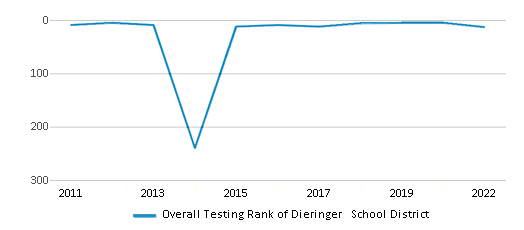
Math Test Scores (% Proficient)
64%
40%
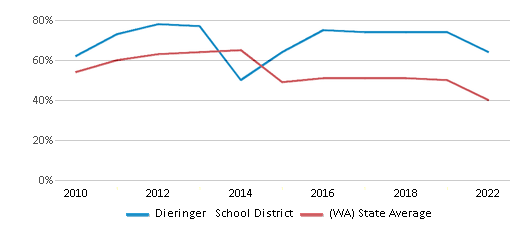
Reading/Language Arts Test Scores (% Proficient)
70%
53%
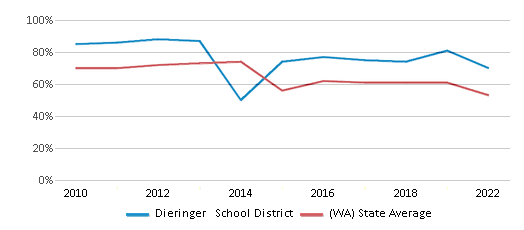
Science Test Scores (% Proficient)
61%
49%
Students by Ethnicity:
Diversity Score
0.57
0.69
# American Indian Students
5 Students
14,077 Students
% American Indian Students
n/a
1%
# Asian Students
155 Students
97,776 Students
% Asian Students
11%
9%
# Hispanic Students
144 Students
284,936 Students
% Hispanic Students
10%
26%
# Black Students
56 Students
52,278 Students
% Black Students
4%
5%
# White Students
911 Students
529,029 Students
% White Students
63%
48%
# Hawaiian Students
18 Students
15,943 Students
% Hawaiian Students
1%
2%
# Two or more races Students
150 Students
97,437 Students
% of Two or more races Students
11%
9%
Students by Grade:
# Students in PK Grade:
44
24,937
# Students in K Grade:
120
76,570
# Students in 1st Grade:
144
77,991
# Students in 2nd Grade:
164
81,918
# Students in 3rd Grade:
142
78,358
# Students in 4th Grade:
158
81,181
# Students in 5th Grade:
158
81,842
# Students in 6th Grade:
161
80,681
# Students in 7th Grade:
169
81,501
# Students in 8th Grade:
179
82,250
# Students in 9th Grade:
-
86,778
# Students in 10th Grade:
-
88,755
# Students in 11th Grade:
-
87,581
# Students in 12th Grade:
-
91,785
# Ungraded Students:
-
-
District Revenue and Spending
The revenue/student of $21,993 is higher than the state median of $18,796. The school district revenue/student has stayed relatively flat over four school years.
The school district's spending/student of $18,186 is less than the state median of $19,246. The school district spending/student has stayed relatively flat over four school years.
Total Revenue
$32 MM
$20,715 MM

Spending
$26 MM
$21,212 MM
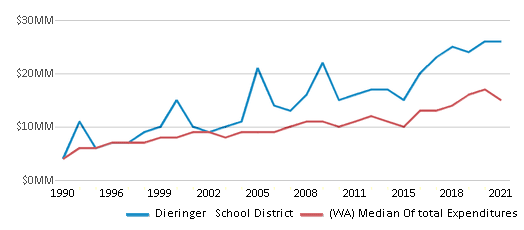
Revenue / Student
$21,993
$18,796
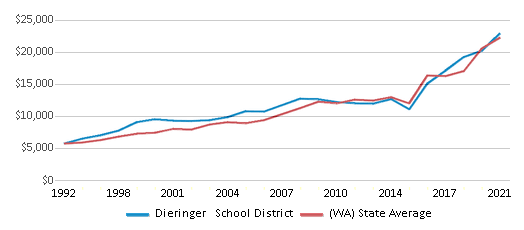
Spending / Student
$18,186
$19,246
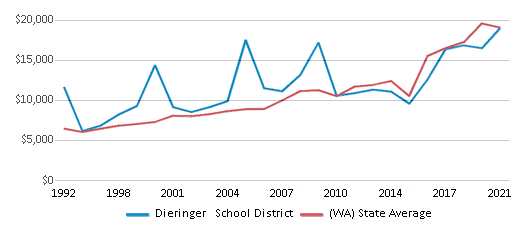
Best Dieringer School District Public Schools (2025)
School
(Math and Reading Proficiency)
(Math and Reading Proficiency)
Location
Grades
Students
Rank: #11.
Lake Tapps Elementary School
(Math: 75-79% | Reading: 65-69%)
Rank:
Rank:
9/
Top 20%10
1320 178th Avenue E.
Bonney Lake, WA 98391
(253) 862-6600
Bonney Lake, WA 98391
(253) 862-6600
Grades: 1-3
| 450 students
Rank: #22.
Dieringer Heights Elementary School
(Math: 66% | Reading: 71%)
Rank:
Rank:
9/
Top 20%10
21727 34th Street E.
Bonney Lake, WA 98391
(253) 826-4937
Bonney Lake, WA 98391
(253) 826-4937
Grades: PK-5
| 480 students
Rank: #33.
North Tapps Middle School
(Math: 59% | Reading: 69%)
Rank:
Rank:
9/
Top 20%10
20029 12th Street E.
Bonney Lake, WA 98391
(253) 862-2776
Bonney Lake, WA 98391
(253) 862-2776
Grades: 6-8
| 509 students
Frequently Asked Questions
How many schools belong to Dieringer School District?
Dieringer School District manages 3 public schools serving 1,439 students.
What is the rank of Dieringer School District?
Dieringer School District is ranked #16 out of 306 school districts in Washington (top 10%) based off of combined math and reading proficiency testing data for the 2021-2022 school year. This district ranks in the top 20% of Washington school districts for: Highest overall rank (Top 5%), Highest math proficiency (Top 5%), Highest reading/language arts proficiency (Top 10%) and Highest science proficiency (Top 20%)
What is the racial composition of students in Dieringer School District?
63% of Dieringer School District students are White, 11% of students are Asian, 11% of students are Two or more races, 10% of students are Hispanic, 4% of students are Black, and 1% of students are Hawaiian.
What is the student/teacher ratio of Dieringer School District?
Dieringer School District has a student/teacher ratio of 17:1, which is lower than the Washington state average of 18:1.
What is Dieringer School District's spending/student ratio?
The school district's spending/student of $18,186 is less than the state median of $19,246. The school district spending/student has stayed relatively flat over four school years.
Recent Articles

Year-Round Or Traditional Schedule?
Which is more appropriate for your child? A year-round attendance schedule or traditional schedule? We look at the pros and cons.

Why You Should Encourage Your Child to Join a Sports Team
Participating in team sports has a great many benefits for children, there is no doubt. In this article you will learn what those benefits are.

White Students are Now the Minority in U.S. Public Schools
Increasing birth rates among immigrant families from Asia and Central and South America, combined with lower birth rates among white families, means that for the first time in history, public school students in the United States are majority-minority. This shift in demographics poses difficulties for schools as they work to accommodate children of varying language abilities and socio-economic backgrounds.





